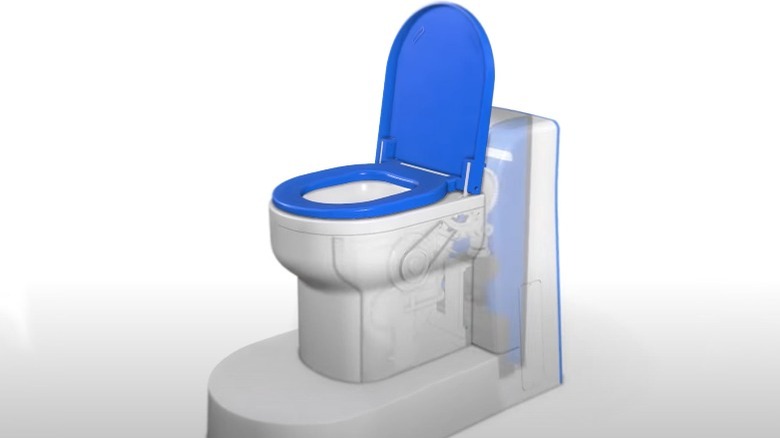The Toilet Tech That Will Change The Future, According To Bill Gates
In 2012, the Gates Foundation awarded a nearly $810,000 grant to Cranfield University to help develop what would eventually become the Nano Membrane Toilet. Unlike other toilets, this unit doesn't require any type of plumbing, instead, it contains its own mechanisms to keep contents separate and clean without giving off any unpleasant odor or loose waste.
The Nano Membrane Toilet is designed to use methods such as solids separation, loosely bound water separation, and combustion to dispose of excess waste products, provide energy, and even produce water for bathing or watering crops.
The toilet's delicate built-in mechanisms are designed exclusively around separating and disposing of urine and fecal matter without the need for added water. The "bad" part of urine is separated out from usable water with a "unique nanostructured membrane wall" within the toilet. After that, the water is sent to a tank where it can be accessed by the user. It's important to note here that the water harvested by this toilet is intended for use in bathing and feeding plants, but the process doesn't quite make the liquid suitable for drinking by humans.
Meanwhile, solids are sedimented (meaning they sink to the bottom of the toilet), then separated with a thin blade and sent to a combustor to be turned into electricity for low-power applications, such as mobile phone charging. After combustion, the result is an ashy substance that requires removal once per month.
A response to the worldwide sanitation crisis
As of June 23, 2021, about 46% of the world population didn't have access to proper sewage treatment according to the World Health Organization. When you use the toilet in a modern home (presumably with a modern plumbing system attached), you probably don't think about where your waste goes after you're finished. It's a starkly different, and much more sanitary experience to have access to such a commodity versus needing to rely on a latrine that exists outside of your home. But outside of North America, Australia, and parts of Europe, it's far more common to see an entire family relying on one bathroom (or a rough equivalent).
When your urine and feces don't have anywhere to go, your toilet (or in many instances, your latrine pit) leaves runoff waste products that attract dangerous bacteria and have the potential to pollute nearby water sources and therefore spread disease. This is often the case in places like Ghana, where "as [of] 2015, only one rural household out of ten were using improved household toilets while three in every ten of them practiced open defecation," according to UNICEF.
In response to the worldwide sanitation crisis, Bill Gates is leading the charge on just one of many entrepreneurial forces that seek to invent and proliferate a newer, cleaner, and less ecologically demanding toilet.

